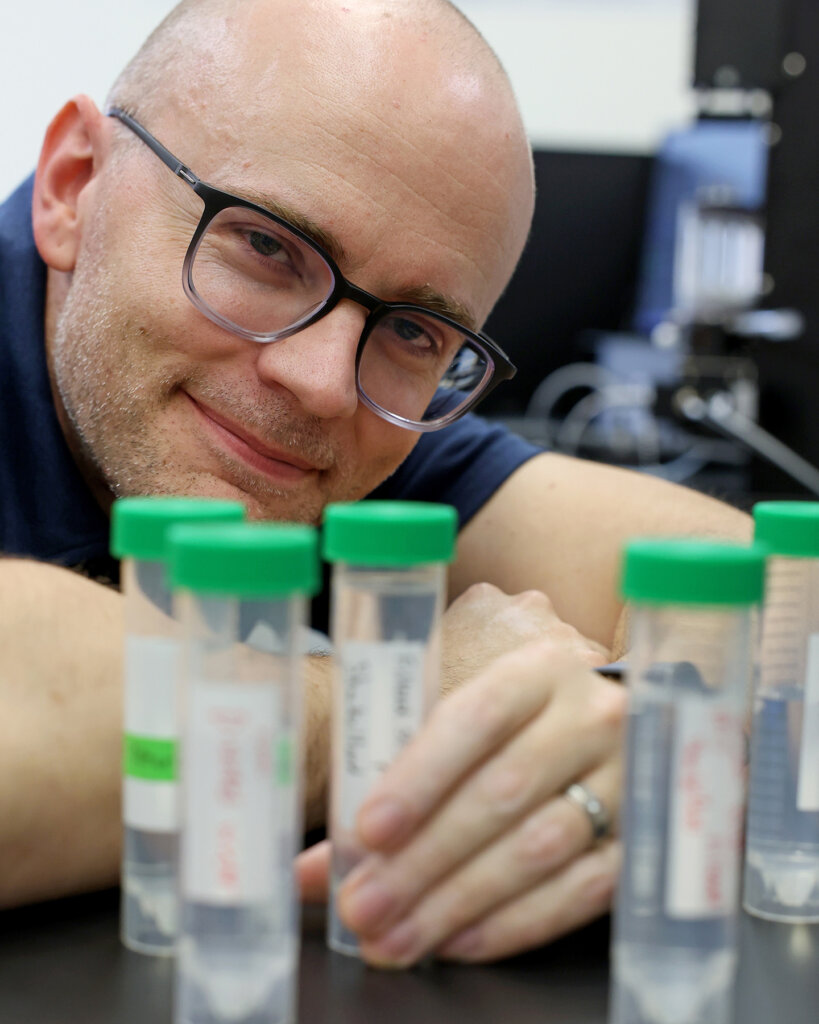
THIS STORY IS FEATURED IN THE 2024 NEW FRONTIERS MAGAZINE
By TYLER ELLYSON
UNK Communications
KEARNEY – Michael Moxley always planned to pursue a career in science.
Ask him why he chose the specific field of biochemistry, and he’ll give you a straightforward answer.
“From a practical point of view, I thought biochemistry would be an area where I could find a job more easily than just straight biology,” he said with a laugh.
Of course, there are other reasons, too.
The University of Nebraska at Kearney associate professor enjoys biochemistry because it’s a combination of natural sciences that can be applied in numerous ways.
“Biochemistry is fundamental,” he said. “It’s kind of like how math underlies science. You can use math to study just about everything, and you can use biochemistry to study just about everything in biology. The same principles can be applied across many different areas.”
Moxley studied biochemistry at the University of Nebraska-Lincoln, earning a bachelor’s degree in 2006 and doctorate in 2012. Initially, he was interested in working in the pharmaceutical industry.
“I wanted to be part of something that I felt would benefit society more directly,” he explained. “What I didn’t know is that the actual research campuses that are available are very few in the United States. There are a lot of manufacturing sites, but the actual research and development is only here and there, and very specialized. Whereas in academia, basically everywhere there’s a university.”
A Lincoln native, Moxley had a wife and three children when he finished graduate school, and he didn’t want to move his family to a large city on the East or West Coast. So, he chose a career path that would allow him to contribute to the field while remaining in the Midwest.
“Ultimately, I can do the same kind of research here, not at the level that you could at a major pharmaceutical company, but I get to do different aspects and I have a little bit more freedom than I would have at a place like that,” said Moxley, who completed postdoctoral fellowships at the Medical College of Wisconsin in Milwaukee and University of Michigan in Ann Arbor.
He joined the UNK Department of Chemistry in 2017.

REGULATING METABOLISM
Moxley and his collaborator, UNK chemistry professor Allen Thomas, are currently working on two different biomedical research projects supported by grant funding from the National Institutes of Health (NIH).
The first project focuses on an enzyme called the pyruvate dehydrogenase complex (PDC), which plays a major role in aerobic energy metabolism. Activated during exercise, this enzyme serves as a critical link between glycolysis and the tricarboxylic acid cycle.
Simply put, “It’s necessary for breaking down glucose,” Moxley explained.
Glucose is a sugar molecule that comes from the foods we consume. It’s the body’s primary source of energy.
However, if it’s not processed properly, high glucose levels can lead to health issues such as diabetes, cancer and heart disease.
“There’s actually another enzyme that’s associated with the PDC – pyruvate dehydrogenase kinase – that kind of regulates this complex and can inactivate it,” Moxley said. “That enzyme actually decreases the activity of the PDC. This often happens in diseases like Type 2 diabetes and cancer.”
Moxley and Thomas are looking for compounds that can inhibit pyruvate dehydrogenase kinase, allowing the PDC to continue doing its job.
“There are no FDA-approved drugs in this area, but there have been lots of promising ones that have come through over the years. They just haven’t made it to the finish line,” Moxley said.
The principal investigator, Moxley started studying the PDC during his postdoctoral work and received funding for the UNK project in September 2023. He specializes in computational biochemistry, allowing the team to use computer models and simulations to identify compounds that might be effective. The most promising prospects are then tested in the lab.
“I’m constantly working on the computer, using new programs to predict what might work,” Moxley said.
The UNK researchers likely won’t develop a new drug – that’s a long shot, Moxley admits – but they can add to the advancements in this area. During his career, Moxley has published research findings in the Journal of Neurochemistry, Biophysical Journal, ChemMedChem and other peer-reviewed journals.
“I’m not truly expecting that we’re going to find something that is going to make its way to humans. That’s just the reality,” he said. “But even if that’s not the case, we all learn from what works and what doesn’t work. That’s part of the process. We’re constantly looking for other papers where they’ve discovered things that might benefit us.”
SEASONAL AFFECTIVE DISORDER
The second research project, led by Thomas, received NIH funding in 2022.
It focuses on seasonal affective disorder (SAD), a condition that occurs in regions where there’s less sunlight during certain times of the year. Most common in the fall and winter months, those impacted by SAD experience symptoms such as fatigue and depression.
Mackenzie Hagemeister, who graduated from UNK in December 2022, came up with the idea for the project while participating in undergraduate research.
Searching for answers for her sister, who struggles with the disorder, Hagemeister researched the pineal gland and its connection to the sleep-wake cycle. Located in the brain, the pineal gland helps regulate the body’s circadian rhythm by secreting melatonin, a hormone produced in response to darkness that impacts our internal clocks.
Hagemeister reviewed previously published studies and identified a key enzyme in the melatonin-making process – serotonin N-acetyltransferase (SNAT). The multidisciplinary research team, which includes Thomas, Moxley, associate psychology professor Evan Hill and associate biology professor Surabhi Chandra, is now working to develop molecules that can block that enzyme and inhibit melatonin production.
“A lot of what we’re doing in these two projects is similar to some extent. We’re looking for small molecules that can bind to a protein, or associate with a protein, and affect its function,” Moxley said. “In this case, it’s an enzyme that’s involved in melatonin biosynthesis. We want to inhibit the production of melatonin, because with a lot of sleep disorders and types of depression, there’s kind of an upregulation of melatonin.”
That project also involves numerous undergraduate students, along with support from world-class scientist Dr. Philip Cole, a professor at Harvard Medical School who conducted previous research in this area.
“He trailblazed it, and we’re here to pick up where he left off and try to add a new perspective,” Moxley said.

SUPPORTING STUDENTS
Now a father of five, Moxley has never regretted his decision to pass on the pharmaceutical industry in favor of higher education.
He enjoys the opportunities to interact with undergraduate students and include them in his research.
“One of the things that’s great about UNK is that they promote undergraduate research,” Moxley said. “I think that’s important for students so they understand where things are coming from in the textbooks. The science textbooks are written by research, and in biochemistry we’re constantly learning new things.
“Students gain a better appreciation for how we obtain that knowledge when they come in and do research, because it’s not easy. Everybody wants to know what the answer is. Did I get it right? Is this correct? And in research you don’t know what the answer is, so that gives them a different learning perspective.”
Moxley typically mentors two or three undergraduate researchers throughout the academic year, and he’s part of INBRE, an NIH-funded program that pays students who participate in biomedical research.
He also uses research to enhance his classroom lessons.
“Teaching is obviously a big part of what we do here, and I think research really helps me in that aspect,” Moxley said. “When we talk about things in class, I feel like I’m a better teacher if I have experience in that area, rather than just reading from a textbook. That helps me speak from experience, so I can provide a little bit more personal insight and explain things in a better way.”
PHOTOS BY ERIKA PRITCHARD, UNK COMMUNICATIONS

MICHAEL MOXLEY
Title: Associate Professor, Chemistry
College: Arts and Sciences
Education: Ph.D. in biochemistry, University of Nebraska-Lincoln, 2012; Bachelor of Science in biochemistry, University of Nebraska-Lincoln, 2006.
Years at UNK: 7
Areas of Research/Specialization: Biochemistry with an emphasis in mechanistic enzymology and computational biochemistry approaches. The project that I am the principal investigator on aims to find ways to activate an enzyme called the pyruvate dehydrogenase complex, which is an essential enzyme in central metabolism, to find therapeutics for diseases such as cancer, Type 2 diabetes and heart disease. Another project that I am a co-investigator on aims to inhibit an enzyme involved in melatonin biosynthesis to find therapeutics for depression and seasonal affective disorder.
Courses Taught: General Chemistry, Biochemistry I and II, Chemistry Foundations and Careers.
Recent Published Articles: “Evaluation of Rhodanine Indolinones as AANAT inhibitors,” ChemMedChem, 2024. “DJ-1 is Not a Deglycase and Makes a Modest Contribution to Cellular Defense Against Methylglyoxal Damage in Neurons,” Journal of Neurochemistry, 2022. “Detailed Evaluation of Pyruvate Dehydrogenase Complex Inhibition in Simulated Exercise Conditions,” Biophysical Journal, 2021.


